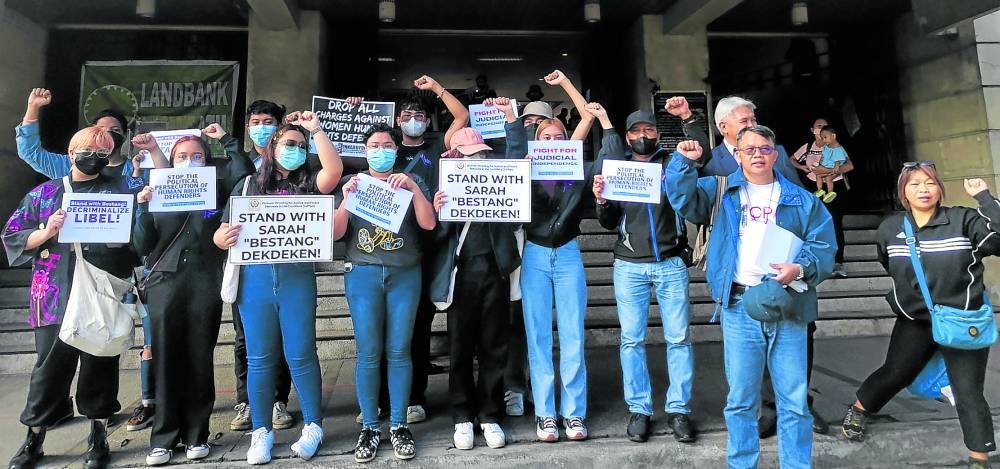
SHOW OF SUPPORT Members of different groups under the Cordillera Peoples Alliance (CPA) show their support for Sarah Dekdeken, CPA secretary general, as she asked a Baguio court on Thursday to give her a new trial following her cyberlibel conviction in December. —KIMBERLIE QUITASOL
BAGUIO CITY — An activist here on Thursday asked for a new trial after being convicted last month in a cyberlibel case filed by a retired police officer over the dismantling of a monument in Kalinga province that was dedicated to Cordillera heroes.
Saying a new trial would “temper the severity of a judgment or prevent the failure of justice,” Sarah Dekdeken, secretary general of the Cordillera Peoples Alliance (CPA), asked a Baguio Regional Trial Court (RTC) to allow testimony from witnesses who were unable to participate in the libel case lodged against her by retired police general R’win Pagkalinawan.
Pagkalinawan, a former Cordillera regional police director, sued Dekdeken for allegedly linking him to the removal of the monument along a road at Barangay Bugnay in Tinglayan, Kalinga, during a CPA news conference on Jan. 14, 2021, a recording of which was posted on Facebook.
Baguio City Councilor Jose Molintas, Dekdeken’s new counsel, attended a hearing for his client’s motion for a new trial on Thursday, which was called by the same judge who convicted Dekdeken.
Baguio RTC Branch 59 Judge Ivan Kim Morales slapped Dekdeken with a P250,000 fine on Dec. 1, 2022, after concluding that her statement against Pagkalinawan at the news conference “was not made in good faith and was instead tainted with malice.”
Morales handles Baguio’s special commercial court and cybercrime court, and serves as the city’s additional family court judge.
Molintas told the Inquirer that some of Dekdeken’s witnesses “were afraid to testify during the past, repressive regime” and failed to appear in the cyberlibel trial.
Lawyer Francisca Macli-ing Claver, Dekdeken’s original counsel, cited a witness from the Butbut community in Kalinga who did not turn up for the 2021 trial.
Fear of attacks
The motion for a new trial said some of Dekdeken’s witnesses had been fearful that testifying would subject them to harassment and intimidation “just like what [had] happened to the accused (Dekdeken),” noting that Pagkalinawan was then the regional director of the Cordillera police. Pagkalinawan retired from service in May 2021.
It also cited a tribal dispute at the time between the Butbut tribe in Kalinga (including Barangay Bugnay) and the Betwagan tribe (in Sadanga, Mountain Province), which prevented witnesses from traveling to Baguio “to execute their affidavits.”
“But this time, the witnesses are willing to come out to corroborate the statement of the accused. If and when presented, it will be proven that the statement of the accused is based on factual matters,” part of the motion stated.
Included in the petition were judicial affidavits of the new witnesses who attested that Dekdeken’s statement was derived from the comments and reactions of Bugnay residents who were “outraged by the [monument’s] demolition.”
The monument, which the CPA put up in 2017, had a marker that honored community opposition to the Chico River Dam project, which was pushed during the martial rule of the late dictator Ferdinand Marcos in the 1970s.
Residents of Kalinga and Mountain Province believed that the planned construction of four huge hydroelectric dams in their provinces could submerge many communities and displace hundreds of households.
‘Hooded men’
The marker was surrounded by a huge metal art wall featuring the silhouettes of community leaders Macli-ing Dulag, Pedro Dungoc and Lumbaya Gayudan. Dulag, one of the strongest voices against Marcos at the time, was killed by soldiers in 1980 and is memorialized at the Bantayog ng mga Bayani’s Wall of Remembrance in Quezon City.
The Kalinga marker was torn down by “hooded men” after midnight. But a resolution passed by Bugnay village council last year faulted the police for its subsequent desecration.
Bugnay Resolution No. 1, Series of 2022, condemned “in its strongest terms the dastardly act of the [Philippine National Police] for demolishing the monument of our local heroes, namely Macli-ing Dulag, Pedro Dungoc and Lumbaya Gayudan, constructed along the national road at Bugnay, Tinglayan, Kalinga.”
In 2020, national and local activists called for the monument’s preservation after provincial officials, including the Kalinga police, endorsed its removal because it stood on the right-of-way of a major highway.